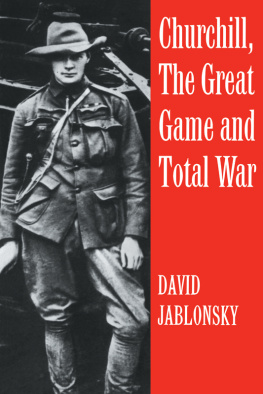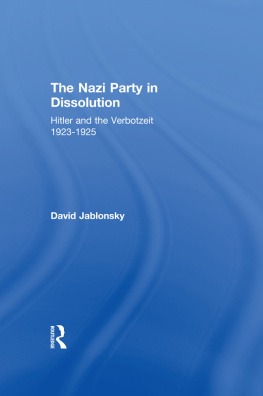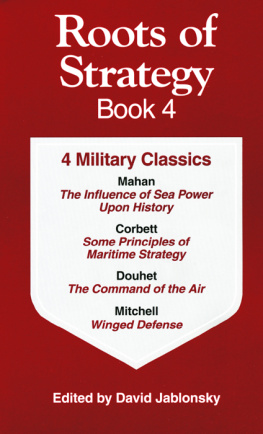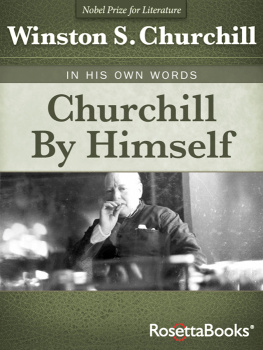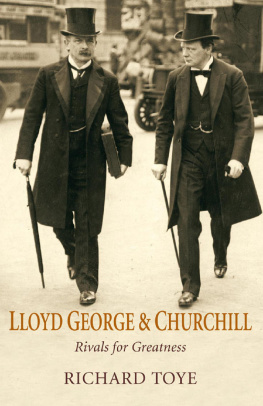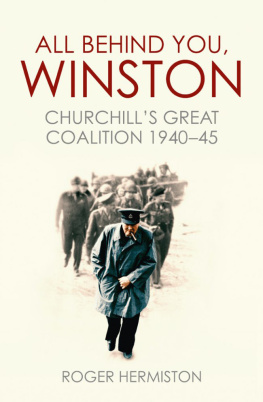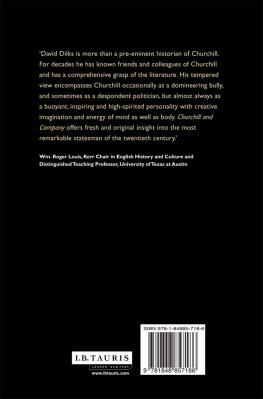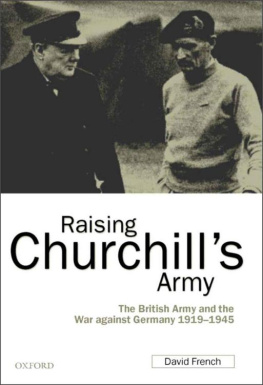CHURCHILL, THE GREAT GAME AND TOTAL WAR
ROUTLEDGE SERIES ON POLITICS AND MILITARY AFFAIRS IN THE TWENTIETH CENTURY
Series Editor
MICHAEL I. HANDEL
U.S. Naval War College,
Newport, RI
1. Leon Trotsky and the Art of Insurrection 19051917
H.W. Nelson
2. The Nazi Party in Dissolution: Hitler and the Verbotzeit 19231925
David Jablonsky
3. War, Strategy and Intelligence
Michael I. Handel
4. Cossacks in the German Army 19411945
Sam Newland
5. Churchill, The Great Game and Total War
David Jablonsky
CHURCHILL, THE GREAT GAME AND TOTAL WAR
DAVID JABLONSKY
U.S. Army War College
With a Foreword by Caspar W. Weinberger
First published 1991 in Great Britain by
Routledge
2 Park Square, Milton Park, Abingdon, Oxon, OX14 4RN
270 Madison Ave, New York NY 10016
Transferred to Digital Printing 2006
Copyright 1991 David Jablonsky
British Library Cataloguing in Publication Data
Jablonsky, David
Churchill, the great game and total war.
1. Great Britain. Churchill, Winston S. (Winston Spencer), 18741965
I. Title
941.0820924
ISBN 0-7146-3367-4 (cased)
ISBN 0-7146-4078-6 (pbk)
Library of Congress Cataloging-in-Publication Data
Jablonsky, David.
Churchill, the great game and total war / David Jablonsky.
p. cm.
Includes bibliographical references.
ISBN 0-7146-3367-4 (cased)
ISBN 0-7146-4078-6 (pbk)
1. Churchill, Winston, Sir, 18741965Views on war. 2. Great BritainHistory, Military20th century. 3. Great Britain-History, Military19th century. 4. World War, 19391945. 5. World War, 19141918. 6. War. I. Title.
DA566.9.C5J24 1991
941.084090dc20
[B] 8925209 CIP
All rights reserved. No part of this publication may be reproduced in any form or by any means, electronic, mechanical, photocopying, recording or otherwise, without the prior permission of Routledge and Company Limited.
Publishers Note
The publisher has gone to great lengths to ensure the quality of this reprint but points out that some imperfections in the original may be apparent
To the memory of
MY GRANDFATHER
SANDERFORD JARMAN
18841954
Major-General, United States Army
Louisiana State University 1904
United States Military Academy 1908
I have eaten your bread and salt,
I have drunk your water and wine,
The deaths ye died I have watched beside,
And the lives that ye led were mine
I have written the tale of your life
For a sheltered peoples mirth,
In jesting guise but ye are wise,
And ye know what the jest is worth.
Rudyard Kipling,
Barrack Room Ballads
Departmental Ditties and Ballads
Caspar W. Weinberger
A quarter of a century after his death, Winston Churchill still invokes the aura of strength and determination to overcome all odds that symbolized the spirit of the nation he led throughout the Second World War. Paradoxically, as this book convincingly demonstrates, this picture of the man who inspired the free world to win the fight for freedom in the greatest of all total conflicts, owes its existence to many characteristics of the late Victorian era into which Churchill was born in 1874. For it was during the waning years of Queen Victorias reign that the future British Prime Minister developed his singular traits of character and formed his concepts of war and personal leadership which were to endure throughout his long life, which helped us all to keep our freedom, and which, I hope, will always inspire us.
Each person who comes into contact with the legacy of Winston Churchill has his own vision of the man. No one remains indifferent for long to the overwhelming personality of this British statesman and the gigantic drama of his life. I have been no exception. What follows, therefore, is a personal interpretation of Churchill and the late Victorian era in which he was raised, and of the effect that upbringing had on his ability to deal with the rapidly evolving complexities of total war in the first half of the twentieth century.
In arriving at this interpretation, I have relied primarily on Churchills written words. After all, the British leader earned his living for much of his life by writing. Beginning with the Malakand Field Force and including his only novel, Savrola, this collection of articles and books spanning over half a century provided an incredibly rich and revealing lode, upon which I could not only build my conception of the man, but renew an appreciation of the English language in the hands of a master. At the same time, so many researchers have sifted through Churchills speeches as well as his unofficial and official correspondence, that I have had no qualms about using secondary sources in this regard to round out my interpretation.
I am indebted to former United States Secretary of Defense, Caspar W. Weinberger, for taking time out from his busy schedule to pen a foreword for this book. Over the years, whether fighting as a combat infantryman in the South Pacific during the Second World War, or playing a major role in lifting America out of the Slough of Despond in the early 1980s, Mr Weinberger has consistently demonstrated the traits of character and leadership personified by Winston Churchill.
I am also indebted to Professor Michael Handel, United States Army War College, who introduced me to the endless variety of Churchills character. Dr Handel, a lifelong student of the British leader, waged a constant campaign to ensure that I maintained an objective view of my subject. His efforts were, Im afraid, futile. After years of studying Adolf Hitler and his fellow thugs, to climb and emerge on the grand open plateau of Churchills life was truly to go from the ridiculous to the sublime.
David Jablonsky
Carlisle, Pennsylvania
When I look back upon the years 1895 to 1900 I cannot but return thanks to the high gods for the gift of existence. All the days were good and each day better than the other.
Winston Churchill
Charles Eade (ed.), Churchill by his Contemporaries, p. 413
The longer you look back, the farther you can look forward.
Winston Churchill
William Manchester, The Last Lion, p. 12
Oh! yet Stands the Church clock at ten to three?
And is there honey still for tea?
Rupert Brooke, The Old Vicarage, Grantchester
In March 1913, Sir Garnet Joseph Wolseley died and was buried in the crypt at St. Pauls near his benefactor, the Duke of Wellington. The regiments escorting the gun carriage in the funeral procession were chosen for their association with the generals military career, a reminder in slow march of his exploits in an era of warfare that would die forever the following year at the Marne. One after another, the units recalled a litany of martial glory from every corner of the British Empire.
Granted a commission by the Duke of Wellington in the last year of the Dukes life, Wolseleys ability, intellectual force and bravery, unusual even in an age of ostentatious courage, rapidly advanced him through the Service. By the time he was promoted to Lieutenant Colonel at the age of 26, he had served with distinction in myriad campaigns, suffering a crippling thigh wound in the Second Burmese War and losing an eye to a bursting shell in the Crimea. After the Crimean War, he fought in the Indian Mutiny, and in 1860 accompanied Lord Elgins expedition to Peking during Britains conflict with China. In 1862, he met with Robert E. Lee at the Confederate headquarters at Winchester shortly after the battle of Antietam. Both Lee and Chinese Gordon remained his personal heroes throughout his long life, their dissimilarities emphasizing the complexity of this quintessential Victorian soldier.



